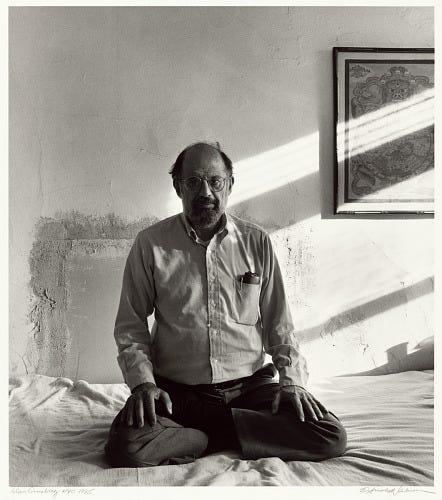Embracing the Secret Poet: How Writing 'Bad' Poetry Fuels Creativity and Liberation for Serious Writers
On Making Art That Is Just Okay
This post is part of an ongoing monthly series on the creative process, wonder, and the numinous. Thank you for liking and sharing my work!
Hi y’all,
I’ve been thinking of myself as a secret poet lately. I’m telling you this terrible truth here, so obviously it’s not a very well-kept secret, but the poems themselves are. This disclosure has more to do with me honoring the way I got into prose—it happened through poetry. My gateway drug.
I started writing poetry again a year ago, with a vigor that surprised me. But of course I did. I had entered my early forties. It was time to return to my roots. It's what people my age do after making the same type of art for decades.
I like to describe the trajectory of a writer in Chef’s Table terms. (For those of you who aren’t familiar, Chef’s Table is a Netflix series that documents the careers of famous chefs around the world.) Just about every chef on that show goes to Paris, learns French cuisine, then returns to their native country to open a successful, high-end restaurant in an urban center.
And then something crashes.
They get tired of French cuisine. They miss empanadas. They miss fried catfish and hoe cakes. They miss khao soy.
This is a moment when things start to get really interesting in their careers. They still have the French technical training, so they take those skills to reinvigorate whatever food their grandmother fed them.
Prose is my French cuisine. But poetry is my grandmother’s biscuits with molasses. I want that taste of home cooking, that sense of rootedness, to feed my prose. Sitting down to write actual poetry returns me to my origins and makes me a more authentic writer.
The true value of the poetry I write is not the poem itself, but the joy I find in the wellspring of its creation: heartfelt, attentive, and vulnerable. I’m a different version of myself when I write a poem. My aesthetic shifts. For example, I enjoy cleverness in prose, but in a poem I don’t place a high priority on this value. I’d rather just feel something. And not joke about it.
Writing mediocre poetry is liberating. I can’t say my poems are all that bad. I can’t say they’re all that good, either. I know enough about the craft of poetry to be a competent poet, but not a great one. If I really tried hard, took a class or two, or asked some poet friends for advice, I’m sure my poetry would be much better. But I’m too busy writing a novel to do any of that.
I tell my students, every serious artist should be a dilettante in another art. It enriches the art you take seriously. Being a secret poet allows me not to be so uptight and careerist about writing fiction. I’m reminded why I write in the first place: because I enjoy the process. If you focus too much on the product, you might have a great career, but you won't probably be as happy, or make work that feels authentic to who you are.
We deserve to not feel pressure to monetize every damn thing we enjoy doing. (And let me just add that, as a writer who primarily publishes short fiction, I don’t really have a choice in the matter.) Creating art that is not good—not expert, not monetized—might be considered decadent, lazy or irresponsible, but the people who think that don’t know what living is for, or why any of us creates to begin with.
Lastly, I’m excited to announce that I’m now offering creativity and writing coaching! I give personalized guidance and direct instruction that is tailor-made for your needs and interests. Wherever you are in your journey as a creative, I’ll show you strategies on how to connect your artistic work to a greater sense of meaning, joy, purpose, and craft. You can read more about my offerings and my background here.
P.s. Here is a picture of Allen Ginsberg, who I blame for introducing me to both poetry and Buddhism. Go read “The Sunflower Sutra,” then go read this lovely piece on Ginsberg by writer and Zen priest
.




This is lovely. Your allusion to the merits of writing mediocre poetry reminds me how when I heard how easy it was to write bad haiku, thinking finally a form of poetry I can be good at...
Never thought of poetry that way, but it is true in my experience too. I've only had the privilege of making my living as a writer for very short times. I finally feel it's time to share what flows through me. I've gained more confidence in reading the writings of Sera Khandro, Dewai Dorje, in this new translation by Christina L. Monson,so I'm looking at my writing differently. And pleased to meet you.